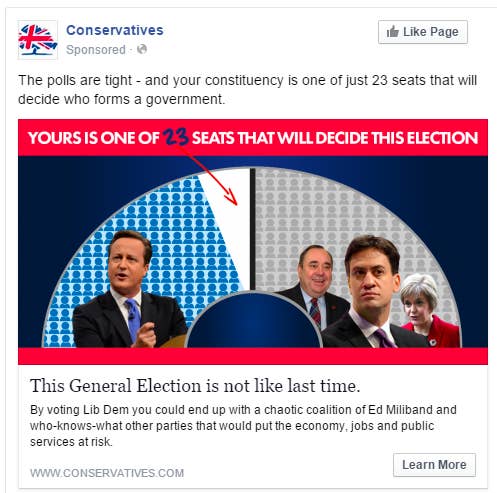
The Conservatives spent £1.2 million on Facebook advertising in the run-up to May's general election, using their financial muscle to circumvent the media and push campaign messages straight into the News Feeds of key voters in marginal constituencies.
British parties are not allowed to buy TV and radio advertising by law but there are no such restrictions on online advertising, meaning whichever party has the most money can avoid restrictions and target adverts to a very narrow group of people. It also meant the Conservatives had less need to rely on campaign messages going viral of their own accord.
By contrast, Labour's online campaign was run on a much tighter budget and focused on motivating supporters to volunteer on the campaign trail, as well as soliciting individual donations to fund the rest of the party's election campaign. Labour spent just £16,454 directly on Facebook in the 12 months before the election, according to new data released on Wednesday, although Labour sources suggested the real figure was slightly higher due to accounting practices.
In total, British political parties paid Facebook £1,370,512 before May's general election, almost all of which was spent by the Tories. UKIP spent £91,322, the Lib Dems spent £22,245, and the SNP spent £5,466.
The Conservatives also spent £312,033 on Google advertising, against Labour's £371. Google owns YouTube, which hosted paid-for Conservative video adverts during the election – again providing another route for the party to directly reach voters in marginal constituencies.
The Conservatives made a strategic decision to switch a large chunk of their advertising spending to Facebook under the direction of former digital strategists Craig Elder and Tom Edmonds.
Last year Elder told BuzzFeed News how Facebook advertising had helped the Conservatives win key marginal seats: “We tested everything: display advertising, Google AdWords, Facebook. We found unequivocally that Facebook was the easiest way to reach the people we wanted to reach in the places we wanted to reach them."
He said Twitter mainly appealed to journalists and people who were already engaged with politics and unlikely to change their minds.
“Last time everyone talked about how it was the first social media election," he said. "This time around it actually was and no one noticed."
As a result, the Conservatives' online efforts were barely noticed by journalists because they targeted disengaged voters in marginal constituencies outside London with Facebook advertising.
"It’s your mum and dad and your gran and granddad who are getting in there [on Facebook]," said Edmonds. "We’re looking for people in front of the telly, or on the bus on the way home, so we will be in their News Feed when they’re bored out of their mind.”
Edmonds added: “Last election we spent 3 or 4 million on billboards. This time it was a fraction of that and we put the money into digital.”
And he said Facebook was the best way to spend this money. “If you’re a 40-year-old mum of two in Derby North, what’s the best way for me to reach you?” he added. “It’s not by sending tweets all day.”
UPDATE: Labour may have spent around £130,000 on Facebook adverts.
Following the publication of this story, Labour sources have suggested the true figure spent by the party on Facebook adverts during the election was in the region of £130,000, although this does not show up in returns to the Electoral Commission because the costs were paid indirectly as part of larger advertising and marketing contracts.
One Labour campaign source said the party was "still outspent 10:1 minimum in terms of digital ads" during the election and their online team did not have the financial firepower to compete with the Conservatives.
"It doesn't change the overall point about their superior strategy, more effective execution and presence of campaign leadership via Lynton [Crosby]," they added.
"They outspent us and were smart," another Labour campaigner commented on their online operation. "We did what we could and were smart."
